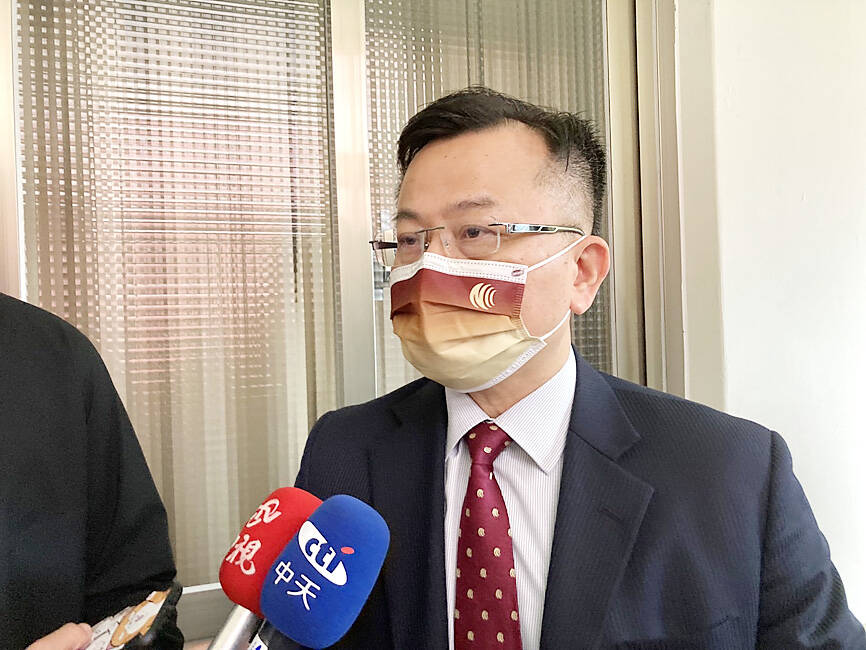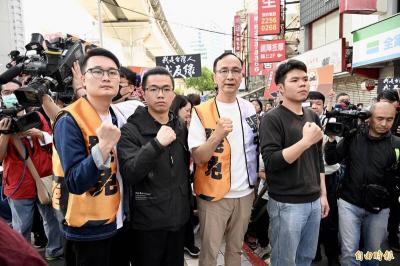The National Communications Commission (NCC) does not plan to push passage of the draft digital intermediary service act next year, as there is no public consensus on the necessity for the legislation, NCC Chairman Chen Yaw-shyang (陳耀祥) said yesterday.
Some people have speculated that the broadcast media and telecom regulator might have hurt the Democratic Progressive Party (DPP) in the local elections on Saturday by pushing for a bill that would restrict online speech freedoms.
“We will not push [the draft act] if the public does not reach a consensus, nor do we have time to present a new version of the draft act next year,” Chen said.

Photo: Chen Hsin-yu, Taipei Times
Chen was responding to a question from Chinese Nationalist Party (KMT) Legislator Hung Meng-kai (洪孟楷) during a meeting of the legislature’s Transportation Committee.
The NCC presented the draft digital intermediary service act to generate public discussion on how the Internet should be governed and regulated, Chen said, adding that the commission is continuing efforts to have public dialogue on the matter despite halting the legislation.
Separately, SET News, Formosa News and Era News have been asked by the NCC to conduct internal investigations after the commission on Saturday received five complaints about their election day news coverage, Chen said.
The criticism was related to problems with the coverage of vote counts in the Taipei mayoral election, including two instances on SET News, two on Formosa News and one on Era News, the NCC said on Wednesday.
The news networks were accused of deliberately inflating the vote tallies of DPP Taipei mayoral candidate Chen Shih-chung (陳時中), showing him leading the race in the early counting.
Some people following SET News on the Internet reported that votes for the DPP Taipei mayoral candidate surged to 376,702 about 100 minutes after polls closed at 4pm, leaving that number static while incrementally adding votes for other candidates.
Separate from the complaints, the NCC and Central Election Commission (CEC) found that SET News mixed up the on-screen vote tally for DPP Pingtung County Commissioner candidate Chou Chun-mi (周春米) with her opponent, KMT candidate Su Ching-chuan (蘇清泉), making it appear that Chou was trailing Su.
“The CEC will determine if the networks contravened the Civil Servants Election And Recall Act (公職人員選舉罷免法), while the NCC will investigate if the networks contravened the Satellite Broadcasting Act (衛星廣播電視法),” Chen said.
The ethics committees of all three networks have been asked to convene within three weeks to review the complaints and errors, publish their investigations online and submit their reports to the NCC, he said.
An independent committee is to review the investigation reports before determining if they have contravened broadcast regulations, Chen said.
The networks could face fines of up to NT$2 million (US$65,289) for failing to verify information before publishing it as per the Satellite Broadcasting Act, Chen said.

The Ministry of Economic Affairs has fined Taobao NT$1.2 million (US$36,900) for advertisements that exceeded its approved business scope and ordered the Chinese e-commerce platform to make corrections in the first half of this year or its license would be revoked. Lawmakers have called for stricter supervision of Chinese e-commerce platforms and more stringent measures to prevent China from laundering its goods through Taiwan as US President Donald Trump’s administration cracks down on origin laundering. The legislature’s Finance Committee yesterday met to discuss policies to prevent China from dumping goods in Taiwan, inviting government agencies to report on the matter. Democratic Progressive Party

Taiwan and its Pacific ally Tuvalu on Tuesday signed two accords aimed at facilitating bilateral cooperation on labor affairs, according to Taiwan’s Ministry of Foreign Affairs (MOFA). The governments inked two agreements in Taipei, witnessed by Foreign Minister Lin Chia-lung (林佳龍) and visiting Deputy Tuvaluan Prime Minister Panapasi Nelesone, MOFA said in a news release. According to MOFA, the agreements will facilitate cooperation on labor issues and allow the two sides to mutually recognize seafarers’ certificates and related training. Taiwan would also continue to collaborate with Tuvalu across various fields to promote economic prosperity as well as the well-being of their

The Taipei District Prosecutors’ Office has continued its investigation into allegations of forged signatures in recall efforts today by searching the Chinese Nationalist Party’s (KMT) city chapter and questioning several personnel including the chapter director, according to media reports. Among those questioned and detained were KMT Taipei chapter director Huang Lu Chin-ju (黃呂錦茹), chapter secretary-general Chu Wen-ching (初文卿), chapter secretary Yao Fu-wen (姚富文) and first district committee executive director Tseng Fan-chuan (曾繁川). Prosecutors said they would not confirm reports about who had been summoned. The investigation centers on allegations that the ongoing recall campaigns targeting Democratic Progressive Party legislators Rosalia Wu (吳思瑤)

Several Chinese Nationalist Party (KMT) officials including Chairman Eric Chu (朱立倫) are to be summoned for questioning and then transferred to prosecutors for holding an illegal assembly in Taipei last night, the Taipei Police said today. Chu and two others hosted an illegal assembly and are to be requested to explain their actions, the Taipei City Police Department's Zhongzheng (中正) First Precinct said, referring to a protest held after Huang Lu Chin-ju (黃呂錦茹), KMT Taipei's chapter director, and several other KMT staffers were questioned for alleged signature forgery in recall petitions against Democratic Progressive Party (DPP) legislators. Taipei prosecutors had filed